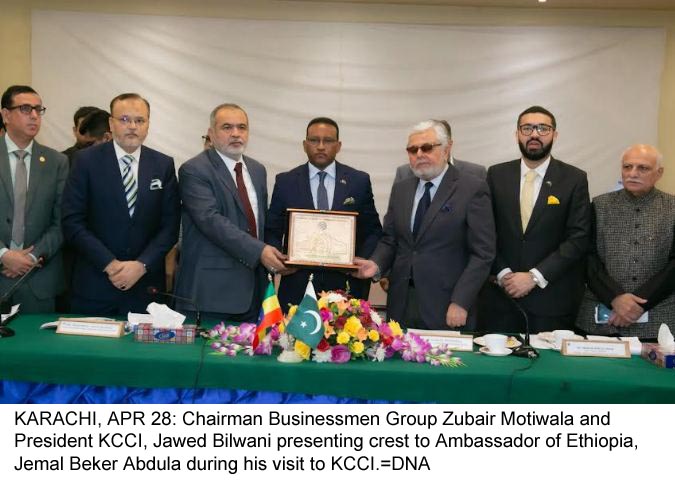
KARACHI, APR 28 /DNA/ – Ambassador of the Federal Democratic Republic of Ethiopia, Dr. Jemal Beker Abdula, while emphasizing the need to further strengthen trade and investment ties between Ethiopia and Pakistan, invited Karachi’s business community to use Ethiopia as a gateway to the vast African market of 1.5 billion people. Businesses operating in Ethiopia also enjoy duty-free and quota-free access to the European Union and the United States of America, which is an additional lucrative opportunity for foreign investors.
Speaking at a meeting during his visit to the Karachi Chamber of Commerce & Industry (KCCI), the Ethiopian Ambassador invited KCCI members to participate in “Invest in Ethiopia 2025,” scheduled for May 12–13, 2025, followed by Pakistan’s Single Country Exhibition from May 15–17, 2025. Ethiopian Airlines will offer a 12 percent discount to visitors attending these events, while affordable hotel accommodations are also available, he added.
The meeting was attended by Honorary Consul General of Ethiopia Ibrahim Tawab, Chairman Businessmen Group Zubair Motiwala, President KCCI Jawed Bilwani, Senior Vice President Zia ul Arfeen, Vice President Faisal Khalil Ahmed, Former Presidents Majyd Aziz and Junaid Esmail Makda, and KCCI Managing Committee Members.
Highlighting the importance of the upcoming events, Dr. Abdula said the “Invest in Ethiopia” conference will attract investors, policymakers, and supply chain stakeholders from across the globe, providing an ideal platform for partnerships, connectivity, and networking. He noted that a large number of participants have already confirmed their attendance at the Single Country Exhibition as well, which will showcase a wide range of Pakistani products to Ethiopian and African markets.
The Ambassador mentioned that Ethiopia has become one of Africa’s leading tourist destinations. Post-COVID, Ethiopia recorded a 40 percent increase in tourist arrivals, thanks to its peaceful environment and rich historical attractions.
Dr. Abdula pointed out that Ethiopia and Pakistan have enjoyed nearly 70 years of diplomatic relations. “We highly appreciate the Government of Pakistan’s ‘Look Africa and Engage Africa policy, encouraging businesses to enter and operate in Africa which can be done through Ethiopia, the true gateway to Africa.”
He further explained that Ethiopia is no longer a landlocked nation but a land-linked country, with 95% of its imports and exports channelled through the Djibouti rail network, requiring just six hours of transit. Ethiopia boasts seven dry ports as well, ensuring efficient logistics without bottlenecks. Ethiopia is among the world’s fastest-growing economies, having recorded an 8.2% GDP growth last year. With a current GDP of US$400 billion, Ethiopia ranks as the largest economy in East Africa and is projected to grow by 8.4 percent this year.
Speaking on the occasion, Chairman BMG Zubair Motiwala expressed optimism that the Ambassador’s visit would open new avenues for economic cooperation between Pakistan and Ethiopia. He noted with concern that Pakistan currently faces a significant trade deficit with Ethiopia, as Ethiopia exports considerably more to Pakistan, including large volumes of soybeans, while Pakistan’s exports to Ethiopia stand at a modest US$4.5 million, far below Pakistan’s export potential.
Emphasizing the need to strengthen bilateral economic and trade relations, Motiwala highlighted sectors such as textiles, rice, and agricultural collaboration as areas of immense potential. He praised Ethiopia’s remarkable agricultural efficiency, especially its water management strategies like drip irrigation and green harvesting, areas where Pakistan lags. “Despite being a water-scarce country, Ethiopia achieves higher per-hectare yields compared to Pakistan, thanks to innovative techniques. We must learn from them”, he added.
Highlighting Ethiopia’s continued investment in infrastructure despite facing budget deficits, Chairman BMG said, “It is astonishing how Ethiopia continues to build roads and develop infrastructure without substantial financial resources. This model should be studied carefully by Karachi Chamber and shared with Pakistan’s government for replication.”
“Despite immense potential, our exports to Ethiopia make up a mere 0.045 percent of our total global exports. This needs urgent attention”, he stressed while advising Pakistani exporters not to focus solely on traditional markets like the US and EU, but to look towards Africa, which he described as a “virgin continent” with abundant opportunities.
“China and India are already major exporters to Ethiopia. We must find ways to competitively position our products — including footwear, carpets, and other goods — to replace or complement offerings from these countries”, he emphasized.
Earlier, welcoming the Ethiopian Ambassador, President KCCI Jawed Bilwani highlighted Africa’s emerging economic significance. “With 1.5 billion people and a combined economic output exceeding $3 trillion, Africa represents one of the most dynamic regions for trade expansion.”
He reaffirmed Pakistan’s commitment to the “Look Africa” policy, which aims to enhance ties with African nations. He reiterated that the current trade figures of US$4.5 million in exports to Ethiopia against US$42 million in imports do not reflect the actual potential of bilateral relations. “There is a tremendous need to diversify and deepen our trade engagement,” he added.
He identified agriculture, food processing, oilseeds farming, climate-resilient seeds development, corporate farming, and halal-certified products as key sectors for collaboration. He also highlighted the strategic importance of Djibouti Port, suggesting that linking it with Gwadar Port could significantly enhance regional trade connectivity between Asia, Africa, and Europe.
President KCCI noted that Pakistan’s SME sector, comprising 5.2 million enterprises contributing 40 percent to GDP and 25 percent to exports, presents attractive investment opportunities. He invited Ethiopian investors to explore sectors such as agro-food, textiles, renewable energy, artificial intelligence, biotechnology, and healthcare.
He further pointed out Ethiopia’s growing demand for construction materials like deformed bars, steel rods, ceramics, and related products — areas where Pakistani companies could actively participate.
















